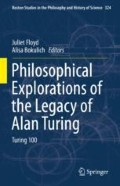Abstract
In this paper I investigate measurement based quantum computers (MBQCs) using the mechanistic view of computation. I begin by demonstrating that Turing’s work cannot serve as an analysis of computation. I proceed to describe the mechanistic view of computation and then apply it to MBQCs. That computers as peculiar as MBQCs can be handled by the mechanistic view provides good confirmation for it. Additionally, I will show how the mechanistic view helps us understand how MBQCs work, and how this understanding might be applied to expand the frontiers of computation.
Notes
- 1.
I will use the term “state” in its normal way to correspond to all features of a Turing machine including the contents of its tape. I use the term “internal state” to describe the state of a Turing machine without consideration of the contents of its tape.
- 2.
For a more detailed discussion of the simple-mapping view, see Piccinini (2011).
- 3.
Typically, one would map equivalence classes of physical states (usually equivalence classes of microstates) to a set of computational states.
- 4.
The specification of “computationally relevant” components is required because there are plenty of components in computers that are necessary, but arguably not relevant to the computations they perform, like cooling fans.
- 5.
It is important to note that the requirement that systems be described as special kinds of mechanisms that process vehicles according to rules is crucial. Else, any system which admitted of a mechanistic explanation would be considered computational, and there are plenty of mechanisms that we don’t think are computational, e.g. refrigerators.
- 6.
Piccinini offers a detailed list of possible failures in his (2007).
- 7.
Though quantum computers operate on continuous systems, their computational power does not depend on manipulating these systems with arbitrarily high accuracy.
- 8.
Neilsen and Chuang (2000) is an excellent reference book for quantum computation.
- 9.
The figures that follow are not completely representative of MBQCs. Simplifications have been made to minimize complications, and to illustrate only the essential points. For example, the computation is depicted as corresponding to a circuit computer performing addition, but the MBQC is reversible, and the ensuing simulation of that circuit computer would be more complicated if reversibility were taken into account. See Raussendorf et al. (2003) for examples of common quantum circuit gates simulated in MBQCs.
- 10.
Technically, the final state will differ from the desired state by a set of rotations (I, σx, σy, or σz, the Pauli matricies and the identity). The information flow-vector mentioned above keeps track of these rotations to ensure the proper computational result.
- 11.
For those familiar with interpretations of quantum mechanics, one might wonder whether this is true in all interpretations. It is straight-forwardly true in dynamic collapse theories and pilot-wave theories. It is true in the Everettian interpretation true, at least as formulated by Wallace (2012). The measurements cause the emergence of worlds that alters the state of non-measured qubits.
- 12.
For example, suppose that a MBQC is simulating a circuit computer. In the case where in the circuit computer that is simulated a qubit only undergoes changes corresponding to the Clifford group gates, the corresponding changes in a MBQC can be delayed until the end, even those changes that correspond to preparation of inputs. Aaronson and Gottesman (2004) have showed that the Clifford group gates alone can be implemented to solve problems in the complexity class Parity-L. So this is the class of problems for which MBQCs have complete temporal flexibility with respect to when dynamic changes are instituted on qubits.
References
Aaronson, S., and D. Gottesman. 2004. Improved Simulation of Stabilizer Circuits. Physical Review A 70: 052328.
Copeland, B.J. 1996. What Is a Computation? Synthese 108 (3): 335–359.
Herschel, J.F.W. 1830. Preliminary Discourse on the Study of Natural Philosophy. New York: Johnson Reprint Corporation.
Neilsen, M.A., and I.L. Chuang. 2000. Quantum Computation and Quantum Information. Cambridge, UK: Cambridge University Press.
Piccinini, G. 2007. Computing Mechanisms. Philosophy of Science 74: 501–526.
———. 2012. Computation in Physical Systems. In The Stanford Encyclopedia of Philosophy (Fall 2012 Edition), ed. Edward N. Zalta. http://plato.stanford.edu/archives/fall2012/entries/computation-physicalsystems/.
Piccinini, G., and S. Bayar. 2013. Neural Computation and the Computational Theory of Cognition. Cognitive Science 34: 453–488.
Putnam, H. 1988. Representation and Reality. Cambridge, MA: MIT Press.
Raussendorf, R., and H.J. Briegel. 2001. A One-Way Quantum Computer. Physical Review Letters 86: 5188.
———. 2002. Computational Model Underlying the One-Way Quantum Computer. Quantum Information and Computation 6: 443.
Raussendorf, R., D.E. Browne, and H.J. Briegel. 2003. Measurement-Based Quantum Computation with Cluster States. Physical Review A 68: 022312.
Searle, J. 1992. The Rediscovery of the Mind. Cambridge, MA: MIT Press.
Turing, A.M. (1936/1937). On Computable Numbers, with an Application to the Entscheidungsproblem. Proceedings of the London Mathematical Society 42(2): 230–265.
Wallace, D. 2012. The Emergent Multiverse: Quantum Theory According to the Everett Interpretation. New York: Oxford University Press.
Author information
Authors and Affiliations
Corresponding author
Editor information
Editors and Affiliations
Rights and permissions
Copyright information
© 2017 Springer International Publishing AG
About this chapter
Cite this chapter
Duwell, A. (2017). Exploring the Frontiers of Computation: Measurement Based Quantum Computers and the Mechanistic View of Computation. In: Floyd, J., Bokulich, A. (eds) Philosophical Explorations of the Legacy of Alan Turing. Boston Studies in the Philosophy and History of Science, vol 324. Springer, Cham. https://doi.org/10.1007/978-3-319-53280-6_9
Download citation
DOI: https://doi.org/10.1007/978-3-319-53280-6_9
Published:
Publisher Name: Springer, Cham
Print ISBN: 978-3-319-53278-3
Online ISBN: 978-3-319-53280-6
eBook Packages: Religion and PhilosophyPhilosophy and Religion (R0)

